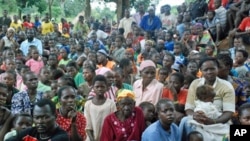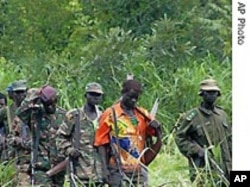A leading member of the Lord’s Resistance Army (LRA) rebel group has demanded an international investigation into allegations his insurgent group attacked forces of the Darfur-based Liberation and Justice Movement (LJM).
Justine Labeja denied the allegations describing it as yet another publicity stunt by LJM to gain leverage at the Doha negotiations with the Sudanese government.
“I don’t see the reason why LRA should go up to Darfur to look for another rebel [group] to attack them. You know, on this planet, anybody is free to say anything about anybody. That is why I’m saying it’s a baseless statement or accusation,” he said.
Labeja challenged the Darfur-based group to provide evidence of such attacks.
“These rebels should come up and say, ‘Okay, we captured one [of] the LRA [rebels] and that they are the ones disturbing us from where we are [and that] they have attacked our base,’” he said.
Rebels belonging to the Darfur-based LJM said Thursday they were attacked by the LRA rebels in the remote area of Dafak leaving at least one of their soldiers dead. The LJM claimed the LRA rebels crossed the border into neighboring Central African Republic shortly after the attack leaving some of their belongings behind.
But, LRA official Labeja denied the accusation saying his group has often been used as a scapegoat for selfish different political reasons.
“It was the LRA that called for the peace talks in Juba with the Ugandan government and some other governments,” said Labeja.
He said the leader of the LRA rebels wants a ceasefire with the governments of Sudan, Uganda and the Central African Republic to jumpstart the peace process ahead of south Sudan’s referendum scheduled for January 9 next year.
Labeja said the “real” perpetrators of the Darfur attacks should be identified and punished.
“The accusation they are talking about is very easy to send a monitoring team to go and verify what happened, why and where exactly," he said. "If it was found that LRA did that, they have to account for it because what we know [is that] LRA has become so many on this planet, especially in the region. You can find LRA in Sudan. You can find LRA in Congo and you can find another LRA in Central African Republic. But, [of] all these, which one are we talking about?”





